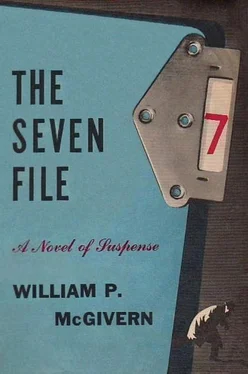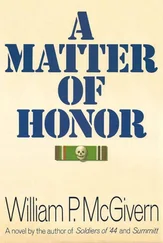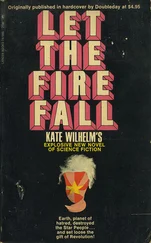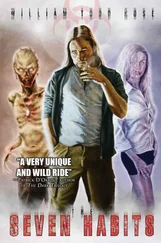William McGivern - The Seven File
Здесь есть возможность читать онлайн «William McGivern - The Seven File» весь текст электронной книги совершенно бесплатно (целиком полную версию без сокращений). В некоторых случаях можно слушать аудио, скачать через торрент в формате fb2 и присутствует краткое содержание. Город: New York, Год выпуска: 1956, Издательство: Dodd, Mead & Company, Жанр: Криминальный детектив, на английском языке. Описание произведения, (предисловие) а так же отзывы посетителей доступны на портале библиотеки ЛибКат.
- Название:The Seven File
- Автор:
- Издательство:Dodd, Mead & Company
- Жанр:
- Год:1956
- Город:New York
- ISBN:нет данных
- Рейтинг книги:4 / 5. Голосов: 1
-
Избранное:Добавить в избранное
- Отзывы:
-
Ваша оценка:
- 80
- 1
- 2
- 3
- 4
- 5
The Seven File: краткое содержание, описание и аннотация
Предлагаем к чтению аннотацию, описание, краткое содержание или предисловие (зависит от того, что написал сам автор книги «The Seven File»). Если вы не нашли необходимую информацию о книге — напишите в комментариях, мы постараемся отыскать её.
The Seven File — читать онлайн бесплатно полную книгу (весь текст) целиком
Ниже представлен текст книги, разбитый по страницам. Система сохранения места последней прочитанной страницы, позволяет с удобством читать онлайн бесплатно книгу «The Seven File», без необходимости каждый раз заново искать на чём Вы остановились. Поставьте закладку, и сможете в любой момент перейти на страницу, на которой закончили чтение.
Интервал:
Закладка:
“Well, don’t bite my head off.” Belle said.
It was nine o’clock Monday morning. Grant was fully dressed, but Belle wore only a slip and a pair of pink mules. The windows of their room faced the water, and Grant stood in front of them doing his deep-breathing exercises. The day would be clear and mild, he thought. And quiet... He was developing a compulsive anger at the look and feel of this countryside. The vivid colors hurt his eyes, and after last night’s storm the stillness seemed to be drumming against his nerves. He was becoming grateful for any noise that shattered the serene spreading silence. In the silences he found himself listening for things...
“What can we do for the baby?” Belle asked him.
She sat on the edge of the bed painting her nails. The smoke from her cigarette stung her eyes, and she tipped her head sideways to avoid it; the pose was rather birdlike and attentive, as if she were listening for sounds in another part of the house. She had decided that morning to make an effort at more careful grooming. If she let herself go to pieces she’d be miserable. She knew that from experience. No more liquor, she had decided. Just one or two highballs after dinner. Sometimes that helped her sleep. She had got up early this morning and forced herself under a cold shower, and now she felt not only clean but virtuous. With her foundation on, and plenty of make-up, she’d look fine. But she was almost too cold to care; her lips were stiff, and she could see the goose pimples on her bare arms and legs.
She realized that Grant hadn’t answered her question about the baby. He stood with his hands clasped behind his back, head thrust forward, staring out of the windows. Like an ox, she thought. And just as communicative. But her reflections were good-humored; she admired his bulk, his silent indifference to her feelings.
“This is really no place for a kid,” she said.
“We could have stayed at the Waldorf, of course.”
“Well, you might have found a place with central heating,” she said.
“Jails have central heating,” he said with heavy irony. “Would that make you happy?”
“What are you going to do about the baby?”
“Don’t worry, a fever won’t kill her.” Grant turned from the window and began pacing up and down the small room. Nothing could slip, he thought. They’d know this afternoon if the Bradleys had the money in their house. Undoubtedly they had; the old man wouldn’t have come all the way down from Boston without it. So it was just a question of the payoff. There was no problem there, either. The arrangements were sure fire. All Creasy had to do was pick up the money. Then they could split up.
“I don’t like the way Duke is acting,” Belle said, inspecting one hand critically. “He behaves like a high school kid when he’s trying to impress somebody.”
“Who’s he trying to impress?”
“Our road-company Florence Nightingale, who do you think?”
“So he likes girls. It’s not a Federal rap.”
“But he’s reckless, Eddie. Nothing matters to him. Not even his own neck.”
“Stop worrying about him. He’ll do what I tell him.”
Belle smiled and resumed work on her nails. She liked a certain amount of rough handling: it was a man’s world and that suited her perfectly. Considerate and gentle men made her uncomfortable. “I’m glad you’re running this deal,” she said.
Grant was smiling faintly as he sat down by the window and lit a cigarette. He wouldn’t have admitted it, but he was grateful for her complacent confidence in him. “You should have known me in the old days,” he said. “I had a dozen characters like Duke hanging around me just to light my cigarettes.”
“Oh, come on now.”
“Well, half a dozen anyway. I had it made all right,” he said, settling himself more comfortably in the chair. “There was a place called Donovan’s in my ward, Belle, a big steak house right near North Clark Street and McCormick. All during the Twenties it ran as a speak. It never closed.” Staring at the tip of his cigarette the smile faded slowly from his broad, pale face. “I went to lunch there every day. So did all the big shots in the city. The mobsters, the bookies and politicians, the big union wheels, even the mayor. They all turned up at Donovan’s two or three times a week. It was like a big club. A tourist couldn’t get a stool at the bar.” Grant frowned faintly, caught up in memories. The smell of the place hit you first, he was thinking; liquor and food and thick expensive cigar smoke, a smell as exciting as the idea of power. Next there was the bustle and noise, the waiters in starched shirts and black ties hurrying around with shots of whiskey and big steak platters, smiling and bobbing their heads to old customers, hardly seeing the people who didn’t count. It was a kick just to walk into the place. Being on the inside of all the deals, that was the big thing though. Getting the straight dope on horses, fights, the shiftings in the police department and the Hall, knowing why things happened when they did, who pulled the strings...
“I never had to order,” he said. “I had the same table for years. I drank twenty-year-old Scotch and ate nothing but steaks that cost six bucks a throw. Every waiter in the joint knew my order.” He glanced up and saw that she had stopped working on her nails and was smiling at him. “It sounds wonderful. Eddie,” she said.
“What’s wonderful?” he said, shrugging; he knew he had been talking foolishly and revealingly. “It’s just a steak house.” He dropped his cigarette on the polished pinewood floor and ground it out with the tip of his shoe. “I’ll go back there one of these days,” he said, and unconsciously his voice became bitter and hard. “They’ll be glad to see me.” The idea of Donovan’s had become a symbol of everything he had lost; in jail he had longed for the feeling of importance that came when the brass-bound door swung open for him. when he strolled into the big noisy room, at ease and at home with the big men who ran the city. And all those years in jail he had dreamed of returning to Donovan’s, planning his entrances to the smallest detail; he would wear a gabardine suit, a two-hundred-dollar job the color of well-creamed coffee, with brown-and-white shoes, a dark blue shirt and red tic, and he’d stop just inside the door for a few seconds, nodding to Joe and Max behind the bar. looking around slowly and easily, and then he’d light a cigarette and walk straight down the room to his regular table. Just like those years in jail had never happened...
Duke’s voice fell across his thoughts. “Hey, Eddie, come down here a second.”
“He couldn’t come up, of course,” Belle said.
Grant looked at her irritably, and then went downstairs to the living room Duke and the nurse stood at the front door, obviously ready to leave; they wore topcoats, and Duke was tossing the car keys up and down in his hand. His brother was standing at the fireplace.
“Keep an eye on him, Eddie,” Duke said. “See that he doesn’t get into the jam.”
“Where do you think you’re going?”
“Into town.” Duke smiled and took the girl’s arm. “Errand of mercy. The kid’s fever seems better, but she needs nose drops, a salve for her chest, that sort of stuff.”
Grant fought to control his swelling anger. “And you’re the hero that’s going to get it?”
“No, not me. the nurse,” Duke said easily. “The people in town know I’m Hank’s brother. If I was shopping for a sick kid the word would get around. Neighbors and friends might drop in to see if they could help. But nobody knows the girl. She can buy what she likes without causing any talk. See what I mean?”
He was right, Grant realized, but that wasn’t important — what mattered was that Duke hadn’t bothered to consult him first.
Читать дальшеИнтервал:
Закладка:
Похожие книги на «The Seven File»
Представляем Вашему вниманию похожие книги на «The Seven File» списком для выбора. Мы отобрали схожую по названию и смыслу литературу в надежде предоставить читателям больше вариантов отыскать новые, интересные, ещё непрочитанные произведения.
Обсуждение, отзывы о книге «The Seven File» и просто собственные мнения читателей. Оставьте ваши комментарии, напишите, что Вы думаете о произведении, его смысле или главных героях. Укажите что конкретно понравилось, а что нет, и почему Вы так считаете.











